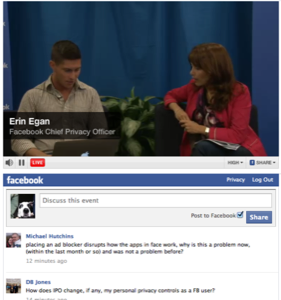
The harder Facebook tries to explain its data-use policy, the more questions it leaves unanswered. Erin Egan, the social networking behemoth’s chief privacy officer, did it again during a 30-minute video conference on May 14. Here’s what she did and didn’t say – and a summary of outstanding concerns about how Facebook can and can’t take advantage of user data.
Egan’s session was window dressing on the announcement made on the company’s blog last week. While the exec answered the general questions read to her by Andrew Noyes, Facebook’s public policy communications manager, most of her answers reiterated points covered in last week’s announcement. Even as more pointed queries piled up in the comments section beneath the streaming video, Noyes shifted the session at the 21-minute mark to answering questions not related to privacy.

We kept a running list of all the questions Egan didn’t get to, and we’ve asked Facebook to provide answers. We’ll update if and when the company illuminates the following questions, which were posted on Facebook’s site during the video Q&A session:
- “Will Facebook ever consider implementing a way that a user can globally determine the level of information they would be willing to share with advertisers instead of the per-app method as it is today?”
- “Will Facebook be using the data it collects to target ads on 3rd party sites?”
- “Also, will it be licensing out this data to 3rd party networks and tech providers?”
- “And also, will Facebook amend its data policies that will prevent an app-owner from using data accrued through Facebook after a user has uninstalled that app?”
- “The revisions mention that Facebook ‘scans’ photos and tags for facial information. Even if I disable Tag Suggestions, can I request that Facebook delete the facial data you already have on me?”
- “Someone from my Friends list copied a personal timeline photo of my child. I don’t know her friends. How might I control use of my timeline photos?”
- “How does [Friday’s initial public stock offering] change…my personal privacy controls as a FB user?”
- “Placing an ad blocker disrupts how the apps in Facebook work. Why is this a problem now (within the last month or so) and was not a problem before?”
We’ve also asked once again for clarification on a question we initially asked over the weekend about a policy that seemingly allows Facebook users to vote down policies they don’t like.
Throughout the talk, Egan insisted that last week’s updates, including a sleek new landing page that Facebook calls its policy hub, aimed to clarify the policies. She was careful to stress that there had been no policy changes and that last week’s move was a response to a request from the Irish Data Protection Commission to better explain existing practices and highlight recent changes.
“Our goal here is to be really transparent with you about our practices,” Egan said.
















